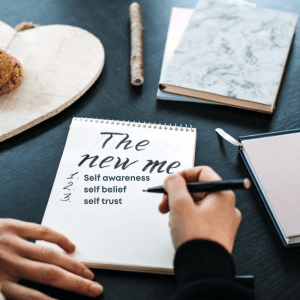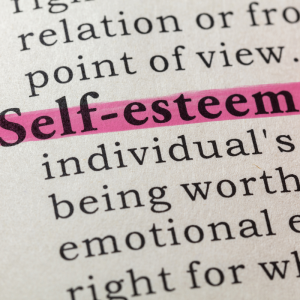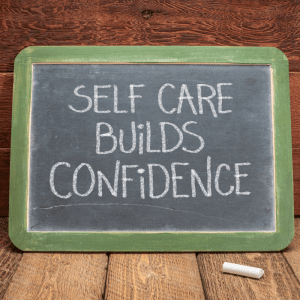Overcoming Imposter Syndrome: A Journey to Self-Acceptance
Imposter syndrome is a silent yet powerful force that impacts countless individuals, especially women, in their professional lives. It is that nagging feeling of being a fraud, even in the face of success and external validation?

Episode 11 of my Mindful Poetic Stories Podcast, is entitled “Imposter Syndrome” (listen here) where I dive deep into my personal struggle with imposter syndrome and the emotional toll it took, as well as the transformative journey towards my self-acceptance and growth.

I highlight not only the debilitating effects of self-doubt, perfectionism, and the pleaser saboteur, but also provide insightful strategies for overcoming them. For anyone struggling with feelings of inadequacy despite achievements, this episode is a must-listen.
Imposter syndrome is defined as the psychological phenomenon where an individual experiences persistent doubts about their abilities and achievements. Despite evidence of success, the individual feels like a fraud, unworthy of their accomplishments. The Imposter Phenomenon, as coined by psychologists Pauline Rose Clance and Suzanne Imes in 1978, as particularly prevalent among high-achieving women as you can read in their 1978 research paper.

For me, it took years to realise that my internal struggles were not unique to me. Learning that imposter syndrome is a common experience was both a revelation and a relief. It led to a deeper understanding of my emotional patterns and self-limiting beliefs, and most especially, I no longer felt alone in my feelings.
A key theme explored in the episode is the perfectionism trap from the stickler saboteur. Perfectionism is often driven by an internalised fear of failure and a deep-seated belief that one must always do more, work harder, and give everything to maintain the illusion of competence. The stickler saboteur is notorious for setting unrealistic standards, making it almost impossible to achieve anything less than “perfect.”

This constant striving for flawlessness often leads to burnout, as individuals push themselves beyond their limits in an attempt to meet unattainable goals. My relentless self-criticism and the inability to accept failure prevented growth and led to my mental and physical exhaustion. You can also find out more by watching my interview with Coach Martha Rice when I was invited to be a guest on her Podcast called Casting the Net https://www.youtube.com/watch?v=w04jsaohKQE
Alongside perfectionism, another significant driver of imposter syndrome is the pleaser saboteur. Many individuals with imposter syndrome go to great lengths to please others, often at the expense of their own well-being. I also share how external validation became a dangerous motivator for me, leading to unhealthy patterns of people-pleasing and excessive work.
The fear of disappointing others is another hallmark of the pleaser saboteur. This fear is exacerbated by an internal judge, or inner critic, who constantly reinforces feelings of inadequacy and unworthiness. I struggled with these voices of self-doubt, believing I needed to constantly prove my worth to others.

The breakthrough came when I learned to embrace failure as a natural part of life and growth. When I through my coaching work explored my limiting beliefs, my saboteurs which were based on fear. By reframing mistakes and setbacks as learning opportunities was essential in breaking free from the toxic cycle of perfectionism.

I learnt that our self-worth is not determined by perfection or external validation, but by the ability to acknowledge and celebrate our unique potential and progress.
Building Resilience: Strategies for Overcoming Imposter Syndrome
The journey towards overcoming imposter syndrome comes from the inside out, it is not easy, but it is absolutely possible, worth it, and is a work in progress.

Here are some actionable strategies for managing and diminishing the negative impact of imposter syndrome:
1. Self-awareness: Recognising the sabotaging behaviours and negative thought patterns that fuel imposter syndrome is the first step toward transformation.
2. Self-compassion: Learning to treat yourself with kindness and understanding, especially when you make mistakes, is key to building emotional resilience.
3. Embrace imperfection: Letting go of the need for perfection opens up space for growth and improvement. Instead of focusing on what went wrong, celebrate progress. Acknowledging that mistakes are part of our learning process and we learn so much from them, in fact much more than we do from our successes.

4. Set realistic goals: Rather than striving for perfection, focus on incremental improvement. This approach fosters a sense of accomplishment and growth over time. I now strive for improvement and progression.
5. Challenge the fears underpinning the Saboteurs: Many of the fears of Pleaser and Stickler Saboteur that drive imposter syndrome were formed during our childhood. Working on rewriting these beliefs through self-reflection can help eliminate the underlying shame and fear of failure.
6. Delegate and ask for help, let go of the need to do everything yourself. Asking for support and trusting others builds collaboration and reduces overwhelm.
Consider seeking coaching or another form of therapy, to help you with this process. You and your life is too precious to suffer in silence.

Mental fitness really helped me build resilience, just as we train our bodies to stay healthy, we can also train our brains to be emotionally resilient. This involves managing negative emotions, setting healthy boundaries, and learning to accept and love ourselves as we are.
Coaching and mental fitness, helped me find my own self value and self worth which resulted in me no longer seeking or needing external validation. This shift in mindset has been essential in developing a stronger sense of self-trust and self-confidence, for which I am now very grateful.

I help my clients with the 3 R’s –
– Recognising recurring patterns
– Realising which are serving and which are debilitating,
– Reconnecting with true self to help, keep what serves, let go of what doesn’t and move from self sabotage to self love

This is the reminder that realising our self-worth is an internal process. True success and happiness come from the ability to acknowledge our innate self value, no matter what mistakes or setbacks we may face. Our mental and emotional well-being are crucial components of professional and personal success, and these can be nurtured through self-awareness, self-compassion, and the willingness to stay open and continue learning.

As in positive intelligence, our Saboteurs come from a need to feel accepted, a need for independence and/or a need for security, they are based on fear and negative emotions.
However, our Sage within is our wise inner self, our intuition, it is where we can find our empowerment, through love. The reconnection process is with our Sage within and as we build this connection we diminish the power the saboteurs have over us.

Conclusion:
For anyone struggling with imposter syndrome or perfectionism, this episode offers hope and a path for freedom. It serves as a powerful reminder that you are not alone, and that overcoming these challenges is not only possible, but necessary for achieving true fulfillment. By embracing your self worth, letting go of the need for perfection, and building mental resilience, and self love, you can step into your true potential with confidence with peace of mind.

Patricia Ahern
Mental Fitness and Self Love Coach
I have moved from Self Sabotage and Neglect to Self Love, reconnecting with my true self and it has transformed my life. So now over to you; I ask you, are you living your life story with old beliefs and thoughts causing negative habits that are creating tension, anxiety, inner bitter judgment, for you and your relationships. What is the price you are paying for continuing in this loop? Just for a moment…. imagine a path of ease and flow, with a sense of calm in your life, where you are in control of your emotions and emotional responses, you’re resourceful, you’re positive, solution focused, with complete clarity for action, with a positive mindset and attitude, mentally fit and resilient and prepared for whatever life throws at you. How do you feel now? I love helping women move from self-sabotage and neglect to self love. Where you can rewrite your story, growing and nurturing your creativity to live your best life, growing from a deeper sense of self-love within, where you can step out of the shadows and into the light of your personal power. Are you ready to take positive action and ownership of your life and start writing your own story? If you are ready, I am ready with love to help facilitate this for you. Get in touch for a free 1-hour completely free (no obligation) session with me, where you can find out more about Mental Fitness and Positive Intelligence and how I can help you achieve that ease and flow path, where you are the love of your life. About me and my self love journey; I love creativity, I love writing, I love curiosity, wonder and awe. I love my inner child, who reminds me how wonderful life is, I love my wise elder self, who spurs me on into my dream future From my journey I now believe that growing Self Love is the bedrock of better well-being, better performance and better relationships. We would not sabotage someone we truly loved, and we would not self sabotage if we truly loved ourselves.



